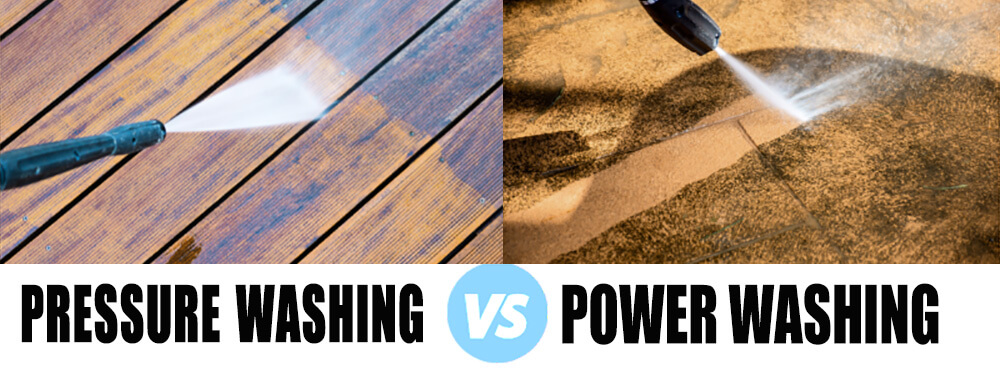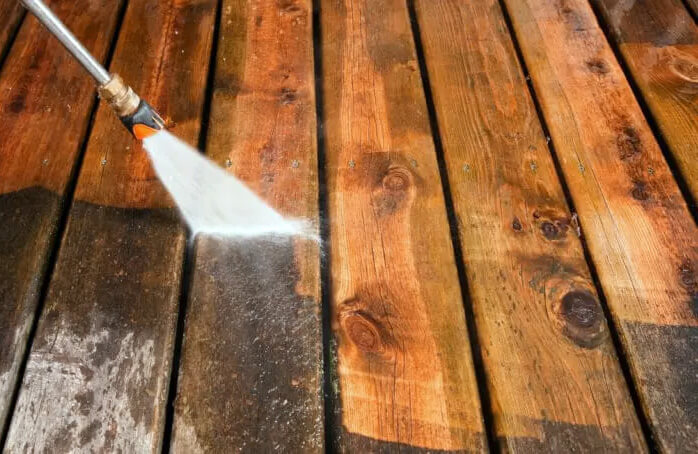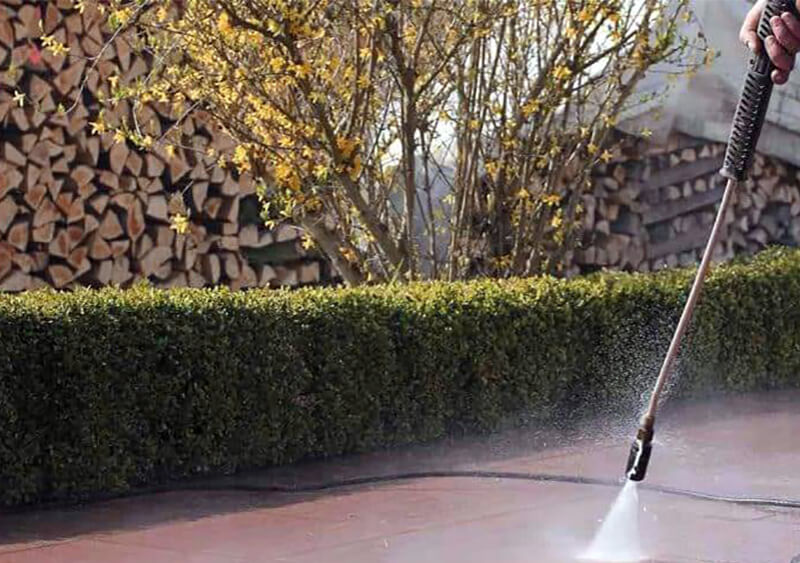17Jan 2024
table of contents

Pressure washing and power washing, both involve use forceful water jets to clean different types of surfaces. Although they have similar effects, they use different processes. The thing is, power washing uses heat in addition to water pressure.
Let's look at the differences between poressure washing and power washing. What's pressure washing? What is power washing? Additionally, we'll explore which surfaces or jobs each cleaning method is suitable for.
When comparing pressure washing and power washing, heat is a key differential. Pressure washing employ cold water, while power washing have the capability to use hot water for cleaning purposes. Hence, beyond merely utilizing water pressure for removing straightforward dirt from outdoor areas, power washing can also elevate the water temperature to tackle more stubborn or tenacious grime.
Power washing is also a heavy-duty option for surfaces like cement or concrete because these durable materials can withstand heat.
Pressure washing is better suited for home or commercial use because it effectively removes dirt without damaging the surface area with heat or excessive pressure.
Pressure washing uses high-pressure cold water to wash away dirt. These machines are less efficient when used to remove moss, mold, and oil stains, but they are powerful enough for driveway and patio cleaning.
Pressure washing leverages the potential of water under high pressure to cleanse surfaces. The force exerted by the water on a dirty area, effaces accumulated dirt, dust, mud, and other substances. Because the water is not heated, pressure washing do not dissolve grease and dirt. Nevertheless, barring instances that might require the cleanup of an auto shop or kitchen, pressure washing can even manage even the most demanding tasks.
There are many pressure washers types on the market. Welcome to inquire about BISON high pressure washer.

Advantages of pressure washing
Versatility: Pressure washing more versatile than power washing. They are available in a variety of PSI settings, enabling them clean most surfaces, without inflicting over damage.
A reason contributing to the popularity of pressure washing lies in their adaptable nozzle options. These nozzles modulate the output level of pressurized water released from the hose. For instance, a 0-degree nozzle directs a pinpoint stream onto the surface, while a 25-degree accessory broadens the surface area covered. This degree of adaptability means pressure washing can tackle an array of tasks like cleansing vehicles, wooden floors, house sidings, and beyond.
Suitable for a variety of jobs: There are many different options for pressure washing. You can choose between different GPM and PSI to ensure you have the right amount of power.
More options: There are many types of pressure washers. The two main types are gas and electric. Gas-powered pressure washers are generally more rugged and suitable for smaller, more demanding jobs. Electric pressure washers are more suitable for widespread home use, and some cordless/battery-powered pressure washers are easier to transport but are less powerful.
Cost: Pressure washing machines are less expensive than power washing machines. First, they don't have a hot water element. Second, they perform different jobs. Power washing are considered more of a commercial or industrial option, while pressure washing are better suited for small jobs or home use.
User friendly: Pressure washing machines are very user friendly and require less technical knowledge to operate.
Of course, this doesn't mean they don't need any operational learning at all. If using for the first time, the instructions should be read carefully to ensure safe operation.
Disadvantages of pressure washing
Surface damage: Some people think they don't have to worry about damaging surfaces because they're not using a power washing machine. However, things are not that simple.
Pressure washing machines are still very powerful. For example, gas pressure washers can still operate at pressures up to 3000 Psi. This much pressure can easily peel or damage various surfaces. Therefore, before you start cleaning, you should know the pressure that different materials can withstand.
Pressure washing emerges as the premier selection for eradication of dust, dirt, mud, debris, and more from a vast range.
Pressure washing are great for walls, floors, driveways, patios, and windows. Given their use of cold water, the threat of heat-induced damage is mitigated.
Some of the best uses for pressure washing are cleaning surface dirt, discolored concrete, moss, algae, and mold.
Pressurized water can clean any area more deeply than traditional cleaning methods. Of course, you still need to be careful when cleaning exterior surfaces. Excessive water pressure can damage paint or softer materials.

Power washing uses high-pressure hot water to clean surfaces. These machines are often called hot water powered washers.
For grease and stubborn dirt, a power washing machine is the best choice. Hot water helps remove and dissolve grease and dirt. This is similar to how dishwashing works, using a combination of force and heat to lift and clean surfaces.
Power washing machines use the power of pressurized water to remove dirt. However, they also use water heated to high temperatures because of water's ability to dissolve grease and other materials.
The combination of high pressure and heat means power washing can clean almost any surface. but. You should be aware that power washing are highly corrosive, and if used on the wrong surface, will cause serious damage.
Power washing is a heavy duty option. While it is advantageous in removing grease, dirt, or stains, power washing also holds the potential to harm the underlying surface. Such as brick, masonry, and wood More delicate materials, may suffer damage when blasted with excessive pressure and heat.
Advantages of power washing
Heating: Hot water cleans better. When water is heated to high temperatures, its molecules bounce back more. These actions effectively break down particles such as grease and mold, which are then washed away.
Pressure: Power washing machines typically use higher water pressure. Power washing typically operate within a range of 2,000 to 6,000 PSI of pressure. They also tend to feature a greater volume of water flow, measured in GPM, compared to pressure washing machines. This results in a greater exertion of pressure and a larger amount of water being directed onto the surface in need of cleaning.
Ideal for large commercial jobs: Power washing are an excellent choice for large commercial jobs. If you need to clean a larger surface area, these machines can save you a lot of time.
Disadvantages of power washing
As mentioned above, power washing is an excellent choice for commercial jobs. However, these powerful features also come with some drawbacks.
Cost: Power washing are generally more expensive than pressure washing machine, the main reason for this is that power washing machines require additional heating elements. This technology can add thousands of dollars to the price.
Less versatile: Power washing are great for larger jobs that require a lot of power. However, they may be too powerful for some smaller tasks. Pressure washing are more flexible and can be used to clean a wider range of surfaces.
Powerful: The power washer's heat means it can effectively clean even the dirtiest areas. However, that same quality may cause it to damage softer materials. Generally speaking, power washing are best for cement and concrete because these surfaces can withstand the heat.
A power washing is the best choice when you need to clean large areas of hard outdoor materials. For example, if your concrete floors are covered in dirt, grease, and weeds that are difficult to remove.
Power washing can also be used to deep clean restaurant kitchens or auto repair shops because hot water is great for removing grease.
Other good uses for power washing are to remove dark black mold and other stubborn substances like chewing gum, ink, or spray paint.
Many people think pressure washing and power washing are same washing, but there are some essential differences between them.
Pressure washing employs high pressure water which proves effective in cleaning items, such as driveways, sidings, windows, decks, among others. Power washing, on the contrast, integrates both the water pressure and heat, making it exceedingly beneficial for heavy-duty tasks. Like large quantities of grease or other stubborn substances.
Both pressure washing and power washing constitute effective ways. The results are stunning and can bring new life to your property. However, some surfaces are too soft for this type of cleaning. Sandstone, asphalt roofing, stained wood, and other painted items can all be severely damaged by improper use of a power or pressure washing. To avoid problems this may cause, consult a pressure washer professional.
inquiry form here
BISON BLOG, All the latest news and views from Bison Machinery.
Related Articles
why does your pressure washer have surging or pulsing how to use soap on a pressure washer when to repair or replace pressure washer pump can you run a pressure washer without water why pressure washer won’t startRelated Products